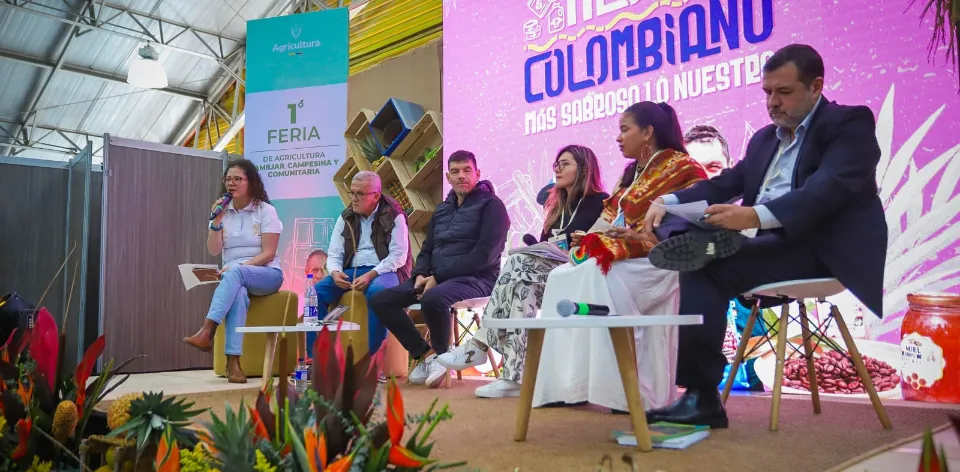 25/6/2024
25/6/2024
Peasant, Family, and Community Agriculture Guarantees Food and Territorial Sovereignty: Claudia Liliana Cortés, Director of UPRA

Working in Agroecology, monitoring current public policies, and strengthening access to markets and technology are key points to reinforce Peasant, Family, and Community Agriculture.
Bogotá D.C., (@Minagricultura, @UPRAColombia, @claudialili76). As part of the family agriculture fair 'Better Colombian, tastier ours,' organized by the Ministry of Agriculture and Rural Development (MADR), the Agricultural and Rural Planning Unit (UPRA) participated in the academic agenda with the panel discussion: 'Challenges of Peasant, Family, Ethnic, and Community Agriculture (ACFC).'
This space featured the participation of Carlos Duarte, professor at the Pontificia Universidad Javeriana de Cali and anthropologist from the National University; Germán Cardoza, advisor to the Minister of Agriculture on Peasant Reserve Zones; Diana Salamanca, Director of Productive Capacities and Income Generation at MADR; Angy Salamanca, representative of the Sustainable Integral Development Association of the Perla Amazónica; and Mario Alexander Moreno, Vice President of Productive Integration at the Rural Development Agency (ADR).
In the first segment, Claudia Liliana Cortés, Director of UPRA, presented the results of the recent publication "Characterization and Typologies of Peasant, Family, and Community Agriculture with an Agrobiocultural Focus." She noted that this exercise identified four types of ACFC, measuring the intensity of four variables: family self-consumption, market integration, technology level, and the use of external labor while maintaining family labor.
During the panel discussion, Diana Salamanca emphasized that ACFC policies must have a strong gender focus, integrated with the National Care System, and promote and recognize rural women. Regarding the challenges, she highlighted the need to strengthen the Public Procurement Law with clear information, as the State currently purchases 10 trillion pesos annually, but there is no information on food acquisition, so "we need to advance in the construction of an Agri-food Information System."
Germán Cardoza stated that it is essential for MADR to monitor public policies that protect this model and made the following call: "a political decision is needed to implement Resolution 464 of 2017, which has more than 19 guidelines, strategies, definitions, and objectives. It is a document with a very robust technical support, developed by FAO, ICA, many institutions, entities, and Ministries. This is a call for UPRA and the Ministry to conduct an evaluation of what has been implemented to date."
"Bringing peace to isolated territories is a key point that allows peasants to continue working towards their dreams and thus build food and sustainable sovereignty," concluded Angy Miramar, who also addressed the importance of implementing public policies on care economies to support women, who are disadvantaged by the lack of access to land.
Similarly, Professor Carlos Duarte reflected on the lack of opportunities for women in rural areas and revealed a study presented by DANE, which provides "an overwhelming figure: while 70% of men are employed in the labor force, only 27% of women are employed in the rural labor force. These figures are quite different, suggesting that, in some way, the countryside is not attractive to women, and this is a fundamental element to consider in public policy."
He also highlighted the importance of creating marketing spaces like the Fair: "It is hard to imagine a space like Corferias being filled by peasant and family agriculture. I was walking through the panels and seeing the productive processes of the Peasant Reserve Zones, with many initiatives and enterprises, which was unthinkable in previous governments. However, we must continue to be even more influential."
For more information, you can watch the full recording of this panel discussion on UPRA's YouTube channel and read the publication Characterization and Typologies of Peasant, Family, and Community Agriculture with an Agrobiocultural Focus on the web portal.

